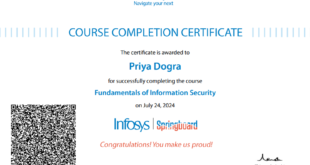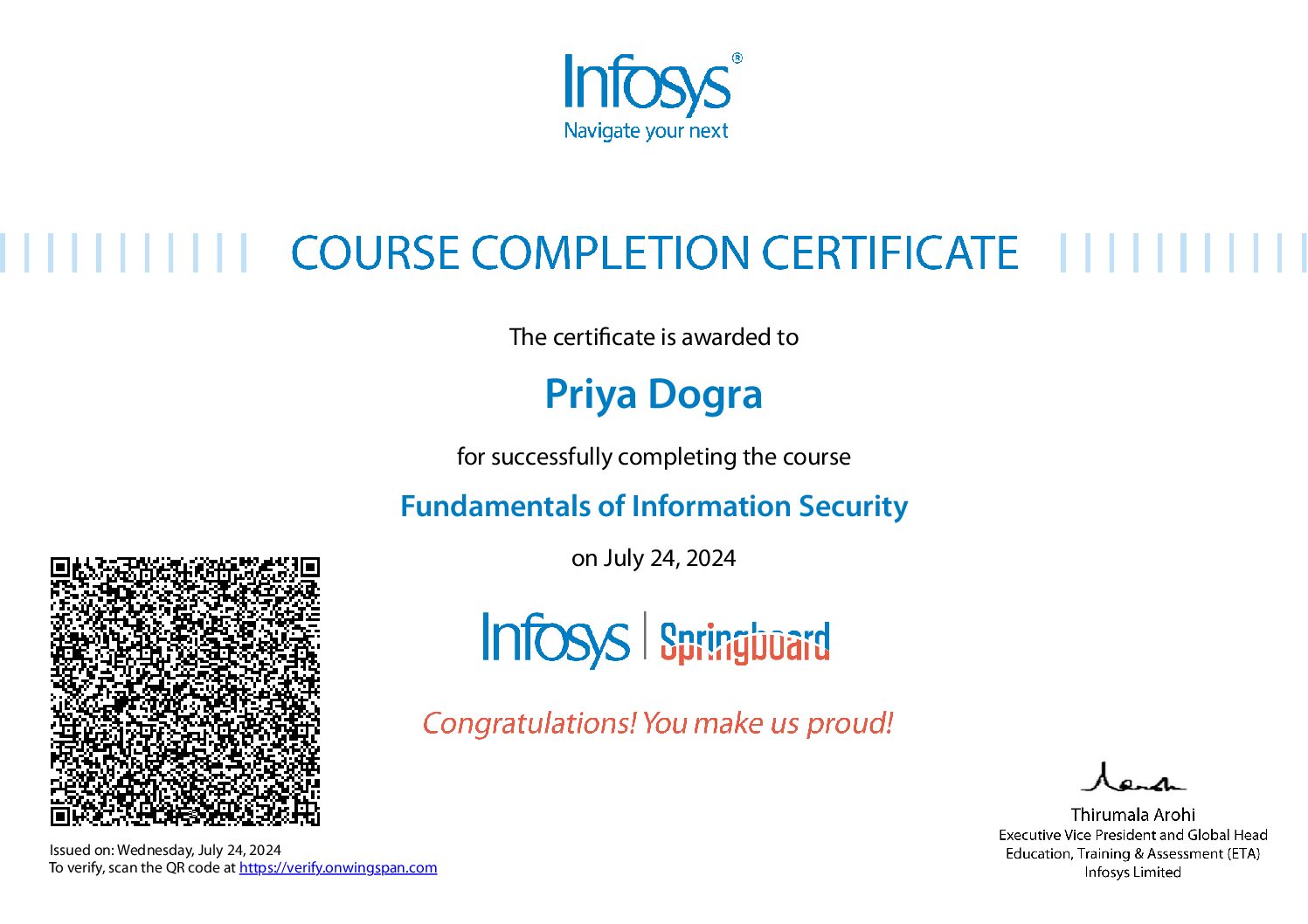Get Certificate: Six Sigma Yellow Belt
Scrum Fundamentals Certified Free Course with Certification

Question 1: Which of the following is an idea categorization tool?
- Pareto Diagram
- Brainstorming
- Affinity diagram
- Ishikawa diagram
Question 2: Specification limits are defined by …………..
- Process data
- The customer
- The Master Black Belt
- The supplier
Question 3: Lessons learned’ is an input for………..
- Analyze
- Improve
- Control
- None of the above
Question 4: Which of the following is normally conducted before creating a Fishbone diagram?
- Brainstorming session
- Check sheets
- Sigma level calculation
- Balanced scorecard
Question 5: In the relationship Y = F(X), Y is
- Output
- Input
- Tool
- Process
Question 6: Who is responsible to ensure that Six Sigma is properly implemented in all the business activities of an organization?
- Champion
- Executive Leadership
- Master Black Belt
- Black Belt
Question 7: Which of the following is an effect of Six Sigma implementation?
- Delays in shipment of products
- Decrease in cost and quality
- Reduction in production of defective products
- Decreased customer retention
Question 8: A control chart is drawn for a process with a sample size of 20. How many special causes of variation are there?
- 0
- 1
- 10
- 20
Question 9: A 6 sigma level process is equivalent to a process having ……………. defects per million opportunities.
- 3.4
- 233
- 40
- 60
Question 10: As the six sigma level decreases, the defect percentage …………………..
- Decreases
- Increases
- Remains constant
- May increase or decrease
Question 11: Which of the following stakeholders is responsible for providing inputs to the process?
- Customers
- End users
- Suppliers
- Employees
Question 12: Fishbone diagram is developed by
- Taguchi
- Ishikawa
- Deming
- Crosby
Question 13: Who is responsible to train Black Belts and Green Belts in Six Sigma implementation?
- Champion
- Project Manager
- Executive Leadership
- Master Black Belt
Question 14: In which phase of the Six Sigma, the sources of variation are identified?
- Define
- Measure
- Analyze
- Control
Question 15: In which phase of the Six Sigma, the process is improved by eliminating the defects?
- Define
- Measure
- Analyze
- Improve
Question 16: Find out the tool which is not used in the Analyze phase.
- Hypothesis testing
- FMEA
- Solution design matrix
- Data analysis
Question 17: In which phase of the Six Sigma, the current process performance is measured and the measurement system validated?
- Define
- Measure
- Analyze
- Improve
Question 18: In which phase of the Six Sigma, the problem statement is defined?
- Define
- Measure
- Analyze
- Improve
Question 19: Process ‘A’ is identified to have 4000 defects per million opportunities. In this context, what is the sigma level of process ‘A’?
- 1
- 2
- 6
- 4
Question 20: Two variables A and B are plotted in a Scatter diagram as shown below.
Choose the best possible option from the list.
- There is a strong positive linear relationship between A and B
- There is a weak negative linear relationship between A and B
- There is a strong negative linear relationship between A and B
- There does not exist any linear relationship between A and B
Question 21: Gage R & R is a tool for………….
- Define
- Measure
- Analyze
- Improve
Question 22: LSL and USL are calculated using …………….
- Sigma level of the process
- Voice of the customer
- Process data
- Control limits
Question 23: DMAIC refers to…………….
- Develop – Measure – Analyze – Improve – Control
- Define – Measure – Analyze – Improve – Control
- Design – Measure – Analyze – Improve – Control
- Define – Measure – Analyze – Implement – Control
Question 24: Identify the basic difference between DMAIC and DMADV.
- DMADV – Design of new products or improvement in existing products; DMAIC – Improvement in an existing process
- DMADV – Improvement in an existing process
- DMAIC – Design of new products or improvement in existing products; DMADV and DMAIC both are same
- None of the above
Question 25: Project CTQ (Y) Defect Definition
Daily water consumption Any day water consumption > 15.6 unit
What is the USL?
- 15.7
- 15.6
- 15.5
- None of the above
Question 26: Suppose you have the following information:
Target = 23, specification limits = ± 3
Average = 23, standard deviation = 0.6
The process is a …………. sigma process.
- 3
- 4
- 5
- 6
Question 27: …………….creates the Six Sigma vision for an organization.
- Champion
- Master Black Belt
- Executive Leadership
- Black Belt
Question 28: In a flow chart the diamond symbol represent ————-
- Start or stop of a process
- Continuation of the process flow to the next page
- Process step/ activity
- Decision box
Question 29: In six sigma, X’s are
- Unknown variables
- Excess variables
- Process inputs
- Response variables
Question 30: Kanban is a tool used in the ……………… phase.
- Analyze
- Measure
- Control
- Improve
Question 31: Which of the following is a DFSS methodology?
- DMAIC
- DMADV
- SIPOC
- COPQ
Question 32: DMADV used
- To improve the existing product or process
- When the existing product or process does not meet the level of customer specification or Six Sigma level even after optimization with or without using DMAIC
- To track the existing process performance
- None of the above
Question 33: Which of the following tool is used to find when 80% of the problems may be attributed to 20% of the causes?
- FMEA
- Ishikawa Diagram
- Histogram
- Pareto Diagram
Question 34: Baseline process capability is an input to the …………..phase.
- Define
- Measure
- Analyze
- Control
Question 35: Who is known as father of Quality?
- Taguchi
- Deming
- Juran
- Crosby
Question 36: The process map, which is created after finding the improvement opportunities from the existing process map, is known as ………………………………
- As-is process map
- Cross functional process map
- Swim lane diagram
- To-be process map
Question 37: Who among the following is a stakeholder in Six Sigma?
- Customer
- Supplier
- End user
- All of the above
Question 38: DMADV refers to……………
- Define, Measure, Analyze, Design and Validate
- Design, Measure, Analyze, Define and Validate
- Define, Modify, Analyze, Design and Validate
- Define, Measure, Analyze, Demonstrate, Verify
Question 39: Which of the following assertions is true with regard to the Six-sigma approach?
- It is a factual-data based methodology.
- It is only used to bring about improvements in manufacturing processes.
- It aims at bringing down defects to 13.4 per million opportunities.
- Its main objective is to make the organization as lean as possible.
 Priya Dogra – Certification | Jobs | Internships
Priya Dogra – Certification | Jobs | Internships




Answers ??